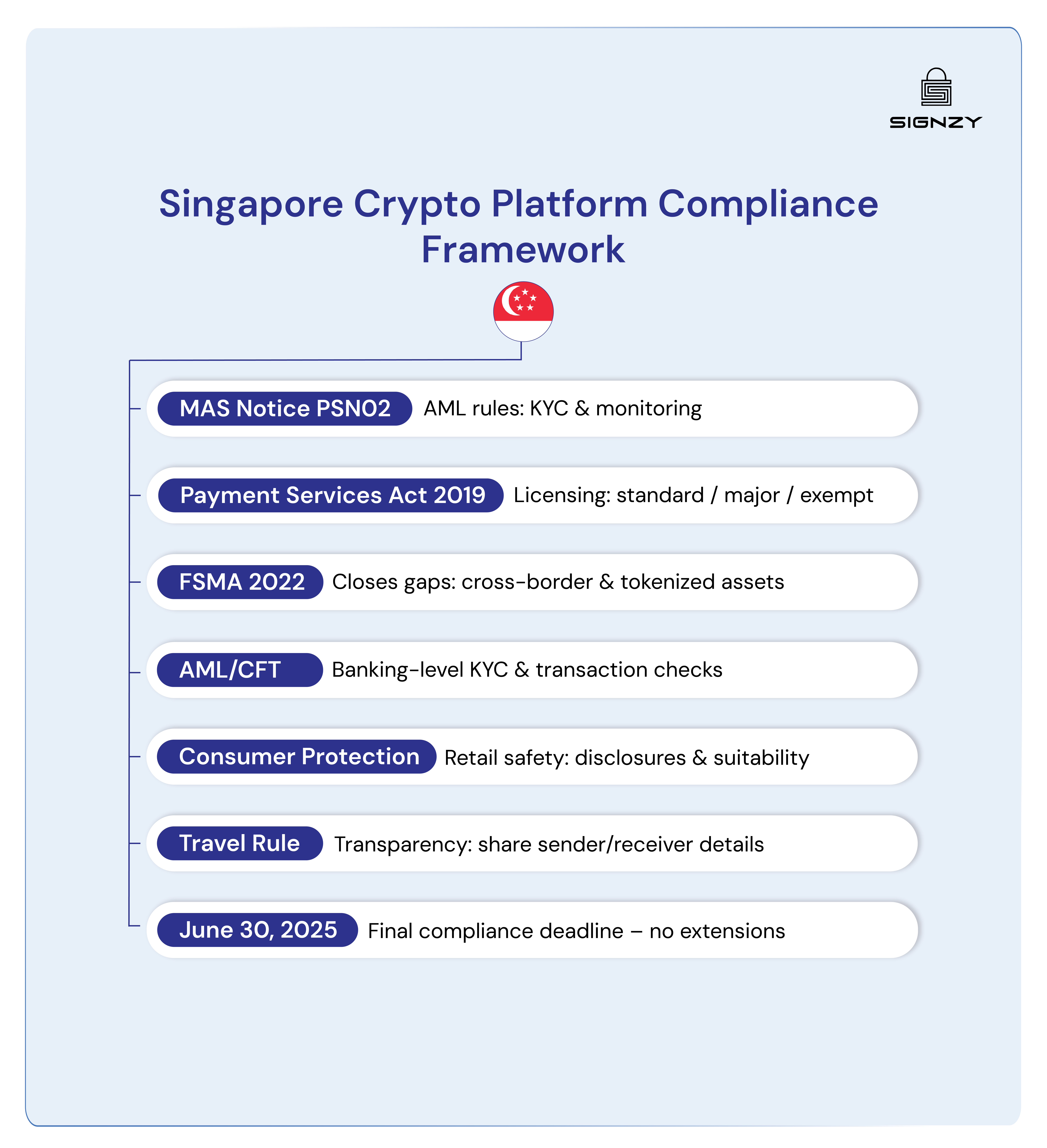Singapore Crypto Regulations: Complete Guide - 2026
- Singapore has established itself as a global leader in cryptocurrency regulation, balancing innovation with consumer protection through comprehensive regulatory frameworks.
- The country’s crypto ecosystem has shown substantial growth with 29 licensed operators by 2024 and nearly $1 billion in merchant crypto payments in Q2 2024.
- Singapore’s regulatory system operates through multiple acts, including the Payment Services Act 2019, Financial Services and Markets Act 2022, and various MAS notices.
- Signzy's combined KYC and AML solution helps crypto businesses meet Singapore's regulatory requirements with deepfake-resistant verification and real-time screening against 1,000+ global sanctions lists.
Let me be honest. Navigating Singapore’s crypto regulations feels like trying to solve a Rubik’s Cube while riding a motorcycle. One minute, you think you’ve got it figured out; the next minute, MAS drops a new circular that changes everything.
But here’s the thing: Singapore is actually getting this right in ways that most countries aren’t even attempting.
I’ve been watching the crypto regulatory space for years now, and what Singapore has done is pretty remarkable. Instead of the usual “ban everything” or “ignore it and hope it goes away” approaches we see elsewhere, they’ve built something that actually works.
Sure, it’s complex: there are compliance hoops to jump through, and enough acronyms to make your head spin (PSA, DPT, SFA, anyone?). But at least there’s a clear path forward, which is more than I can say for most places. And with this guide, I am going to help you get the full context of the landscape.
Related Resources
Is cryptocurrency legal in Singapore?
Yes, cryptocurrency is legal in Singapore. The government treats it as a regulated financial service under the Payment Services Act 2019. While crypto isn't recognized as legal tender (the Singapore Dollar holds that status), it's perfectly legal to buy, sell, trade, and hold digital assets as long as the platforms facilitating these activities are properly licensed.
Singapore built a clear regulatory path instead of taking the ban-everything approach seen in some countries or the ignore-and-hope-it-goes-away strategy used in others. If you want to provide crypto services like exchanges or wallets, you need a Digital Payment Token license from MAS. That's the core requirement.
The numbers show it worked: more than 2,000 blockchain companies have set up shop here. Crypto investments hit $1.2 billion in 2022, and even when global funding dried up in 2023, Singapore kept the lights on while other countries shut everything down.
Who regulates Cryptocurrency in Singapore?
The regulatory framework involves three main government bodies:
- Monetary Authority of Singapore (MAS): Singapore’s central bank and financial regulator. Controls all banking, insurance, and securities markets in the country. For crypto, they issue licenses to exchanges and wallet providers, set compliance rules, and monitor the industry. As of 2025, 33 companies have proper MAS licenses now.
- Inland Revenue Authority of Singapore (IRAS): Singapore’s tax collection authority. They determine tax rates and collect all government revenue. For crypto, they classify whether trading counts as business income or capital gains and set clear tax obligations.
- Accounting and Corporate Regulatory Authority (ACRA): National agency that registers all companies and regulates accountants. Crypto businesses register here like any other company, file annual returns, and follow anti-money laundering rules.
This coordinated approach created a system where crypto businesses can operate with legal clarity.
Now, let’s see how it all started.
When did Singapore start regulating cryptocurrency? Historical context explored
Singapore's approach to crypto regulation was laid in January 2019 when Parliament passed the Payment Services Act, which took effect in January 2020. From then to the present, we can put the evolution into three buckets:
- 2019-2020 - The Foundation: Parliament passed the Payment Services Act in January 2019, taking effect by January 2020. The Act wasn't crypto-specific. It regulated the entire payment services sector, with digital tokens treated as one category among many. MAS positioned Singapore as a clear-rules jurisdiction, which drew crypto companies looking for regulatory certainty.
- 2021-2022 – The Shift: The regulatory tone changed during this period. MAS placed Binance on an alert list for operating without proper licensing and began issuing public statements about crypto trading risks for retail investors. In April 2022, the Financial Services and Markets Act closed a regulatory gap: Singapore-incorporated companies serving only overseas customers now fell under regulation. Platforms that had been using Singapore's infrastructure while avoiding local oversight could no longer operate that way.
- 2024-2025 – Full Enforcement: The regulatory requirements became more detailed. Customer asset segregation became mandatory. Retail investors had to pass knowledge tests before trading. The June 30, 2025, compliance deadline was set with no extensions. Platforms either meet the requirements or cease operations.
With that said, let's now see the current state of cryptocurrency, followed by current regulations.
💡 Related Blog:
Which laws and regulations govern cryptocurrency platforms in Singapore?
Singapore has built what might be the most comprehensive crypto regulatory framework in the world. The system covers everything from basic licensing to advanced cybersecurity requirements.

1. MAS Notice PSN02
This notice forms the foundation of Singapore’s approach to preventing money laundering in crypto. PSN02 requires every crypto platform to know exactly who its customers are and what they are doing with their money.
The notice covers detailed procedures for customer verification, ongoing monitoring of transactions, and reporting suspicious activities to authorities. More or less, this acts as the rulebook that ensures crypto platforms operate like traditional financial institutions when it comes to preventing financial crimes.
Singapore is one of the countries with the lowest rate of corruption in the world. It's only normal for them to want every exchange to meet such high standards, and hey, it allows them to legitimize crypto. Just don't take Singapore (nor India to that extent) as the norm, they're the exception.” — OMFGROFLMAO2
2. Payment Services Act 2019 (PSA)
The Payment Services Act is Singapore’s primary law for regulating crypto platforms. This act determines who can legally operate cryptocurrency services and under what conditions. The framework recognizes that different types of crypto businesses pose different levels of risk and regulates them accordingly.
| License Type | For | Volume Threshold | Minimum Capital Required | Key Requirements | Best For |
|---|---|---|---|---|---|
| Standard Payment Institution License | Smaller Operators | Up to SGD 3 Million Monthly | SGD 100,000 | Basic operational standards, Standard compliance measures, Regular reporting, Customer due diligence | Small to medium crypto exchanges, wallet providers, payment processors |
| Major Payment Institution License | Large-Scale Operations | Above SGD 3 Million Monthly | SGD 250,000 | Enhanced compliance, Advanced risk management, Comprehensive audit, Stricter operational standards | Major exchanges, institutional platforms, high-volume trading platforms |
| Exempt Payment Service Provider | Limited Scope Operations | Very specific low-risk activities | Varies by activity type | Notification to MAS, Follow specific restrictions, Limited scope, Regular compliance monitoring | Niche service providers, specialized platforms, limited-scope operators |
So basically, if you are:
- Under SGD 3M → Standard Payment Institution License
- Above SGD 3M → Major Payment Institution License
- Perform Very Limited Activities → Consider Exempt Status
The PSA creates a tiered system that scales regulatory requirements with business size and risk profile, ensuring both innovation and consumer protection.
3. Financial Services and Markets Act 2022 (FSMA)
The Financial Services and Markets Act extends Singapore’s regulatory reach to catch crypto businesses that previously operated in gray areas. This law specifically targets platforms serving customers outside Singapore but maintaining some connection to the city-state.
The act covers custody services for tokenized securities and gives MAS broader powers to supervise cross-border digital asset activities. FSMA essentially closes regulatory gaps that some operators were using to avoid oversight.
June 30, 2025, marked the final deadline for compliance with FSMA requirements. After this date, any platform providing digital token services without proper licensing was required to cease operations immediately.
4. Anti-Money Laundering (AML) and Counter-Terrorism Financing (CFT) requirements
Singapore’s AML and CFT rules for crypto platforms mirror international banking standards. These requirements ensure that digital assets cannot be easily used for money laundering or terrorist financing. The standards are comprehensive and leave little room for interpretation.
- Customer Due Diligence: Complete identity verification, including government ID checks, address confirmation, and beneficial ownership identification for corporate accounts
- Suspicious Activity Reporting: Mandatory reports to authorities within specific timeframes when transactions appear questionable or suspicious
- Record Keeping: Detailed documentation of all customer interactions and transactions is maintained for at least five years, with specific requirements for cross-border activities
- Transaction Monitoring: Automated systems that flag unusual patterns, large transactions, or activities that deviate from customer profiles
- Staff Training: Regular education programs ensure that all employees understand AML requirements and can identify potential red flags
- Independent Audit: Annual third-party assessments of compliance programs to verify effectiveness and identify improvement areas
These requirements create multiple layers of protection against financial crimes while ensuring crypto platforms maintain the same standards as traditional financial institutions.
"Our old AML system flagged everything. We were investigating 200+ alerts weekly, and 95% were garbage. Signzy brought that down to maybe 30 alerts, and most are actually suspicious. My team can finally focus on real threats." — Compliance Director, Insurance Platform (100+ employees)
5. Consumer Protection regulations (September 2024)
The updated consumer protection rules show that MAS takes retail investor protection seriously. These regulations prevent crypto platforms from taking advantage of inexperienced investors through misleading marketing or inappropriate products.
The rules require clear risk disclosures, proper customer suitability assessments, and restrictions on certain high-risk practices like credit card purchases of cryptocurrencies.
6. Travel Rule compliance
The Travel Rule requires crypto platforms to share customer information when processing transfers above certain amounts. Both sending and receiving platforms must collect and exchange details about the transaction parties. This rule applies to all significant crypto transfers regardless of the specific cryptocurrency or blockchain used.
The requirement helps authorities track large transactions and prevents the use of crypto for illicit activities.
7. Stablecoin regulatory framework
Singapore finalized its stablecoin regulatory framework in August 2023, applying to single-currency stablecoins (SCS) pegged to the Singapore Dollar or any G10 currency (USD, EUR, JPY) issued in Singapore.
If your stablecoin has a circulation value exceeding SGD 5 million, you need a Major Payment Institution license to conduct "Stablecoin Issuance Service." Issuers must maintain reserve assets equal to 100% of coins in circulation using high-quality, liquid assets held separately with approved Singapore custodians. Redemption must occur within five business days at par value.
Only issuers meeting all framework requirements can apply for the "MAS-regulated stablecoin" label, which helps users distinguish regulated tokens from unregulated alternatives.
How is cryptocurrency taxed in Singapore?
Singapore has no capital gains tax, which means most individual investors pay zero tax on their crypto profits. If you buy Bitcoin, hold it for a year, and sell it for a gain, that profit isn't taxed. This applies whether you're holding for the long term or making occasional trades for personal purposes.
The tax situation changes when your activity resembles a business. IRAS uses what's called the "badges of trade" test to determine whether your crypto activity counts as trading income. They look at factors like transaction frequency, holding period, profit motive, use of leverage, and how systematically you approach trading.
If IRAS classifies your activity as a business, your profits become taxable income at Singapore's corporate rate of 17% or individual rates up to 24%.
- For businesses accepting crypto payments: When you receive cryptocurrency for goods or services, you're taxed on the fair market value of what you provided at the time of the transaction. IRAS treats this as a barter trade. The same logic applies in reverse when you pay for business expenses with crypto. You can claim a deduction based on the value of goods or services received.
- Mining and staking: Hobby mining isn't taxed. If you mine systematically with substantial equipment and time investment, IRAS may classify it as business income. For staking rewards, there's a threshold: if your combined staking and lending rewards exceed SGD 300 annually, the full amount becomes taxable as miscellaneous income. Below SGD 300, it's tax-free.
- GST on crypto transactions: Most cryptocurrencies classified as Digital Payment Tokens are exempt from Singapore's 9% Goods and Services Tax. This exemption covers Bitcoin, Ethereum, and similar tokens. However, NFTs and certain utility tokens may not qualify for the exemption and could be subject to GST.
💡 One important compliance note: IRAS has significantly increased audits on crypto transactions. Common issues include non-reporting of transactions, misclassifying trading income as capital gains, and inadequate record-keeping.
Licensed exchanges in Singapore likely report suspicious activities to authorities, and Singapore is expected to adopt the OECD's Crypto-Asset Reporting Framework, which will increase transparency for cross-border holdings.
What's coming next for Singapore's crypto regulations?
Singapore has several major regulatory developments scheduled for 2026: draft stablecoin legislation, tokenized government bills trials using wholesale CBDC, and expanded cross-border tokenization infrastructure.
Draft stablecoin legislation arriving in 2026
MAS confirmed at the Singapore FinTech Festival in November 2025 that draft legislation for stablecoins will be published next year. The framework prioritizes full reserve backing with high-quality liquid assets and reliable redemption mechanisms.
MAS Managing Director Chia Der Jiun warned that if regulated stablecoins become systemically important, the rules may need further tightening to prevent 2008-style money market fund failures.
Issuers like StraitsX and Paxos Digital Singapore are expected to become the first MAS-regulated stablecoins once the law takes effect.
Tokenized MAS bills trial with wholesale CBDC
Singapore will trial tokenized government bills in 2026, settled using wholesale central bank digital currency. Primary dealers will issue and settle MAS bills through blockchain-based tokens, testing 24/7 settlement, reduced intermediaries, and improved collateral efficiency. This follows successful 2025 trials where DBS, OCBC, and UOB conducted interbank lending using Singapore dollar CBDC.
The pilot represents MAS's shift from experimentation to real-world deployment of tokenized financial infrastructure.
BLOOM initiative and cross-border standards
The BLOOM initiative, launched in October 2025, supports trials with tokenized bank liabilities and regulated stablecoins for settlement. MAS is working with financial institutions to integrate these assets into payment rails and cross-border transactions.
Singapore also partnered with Germany's Deutsche Bundesbank to develop universal standards for tokenized assets. This collaboration builds on Project Guardian, which now includes over 40 global financial institutions working toward interoperable tokenized finance systems.
These initiatives position Singapore as a testing ground for regulated digital finance infrastructure that other jurisdictions will likely watch closely.
How Signzy enables Cryptocurrency platforms to streamline compliance in Singapore?
Building MAS-compliant infrastructure from scratch takes months and burns capital before you serve a single customer.
Signzy's platform handles the complete regulatory stack, including KYC, KYB, AML screening, and transaction monitoring solutions, so you can focus on growth instead of reinventing compliance wheels.
↪ Modular KYB that integrates seamlessly with KYC workflows
Corporate verification goes beyond surface checks. Signzy validates business registration, confirms beneficial ownership structures, verifies directorship details, and cross-references against corporate registries.
The system integrates individual KYC checks for all directors and significant shareholders, creating a complete ownership picture. This modular approach means you can:
- Run comprehensive business verification for institutional clients
- Add or remove checks based on customer risk profiles
- Scale KYB workflows across different business types
- Maintain flexibility while meeting Major Payment Institution license requirements
The pay-per-use model means you're not locked into expensive enterprise packages for features you don't need.
↪ Real-time AML screening against 1,000+ global sanctions lists
Every onboarding triggers instant checks against comprehensive watchlists, including OFAC, UN, EU, and Singapore-specific databases. The system screens individuals and entities against PEP lists, sanctions, and adverse media in real time.
When a match appears, you get immediate alerts with risk scores and audit-ready reports for STR submissions to Singapore's Commercial Affairs Department and MAS. Daily watchlist updates ensure you're never screening against outdated data.
"Adverse media monitoring is more thorough than I expected. Picked up a small local news article about one of our loan applicants involved in a fraud case. Mainstream media hadn't covered it yet. That early warning saved us $200K." — Director of Fraud, Credit Union (300+employees)
↪ Globally scalable verification for 180+ countries
Singapore platforms serve customers across multiple jurisdictions, each with different documents and requirements. Signzy authenticates 14,000+ document types globally, from Singapore NRICs to Malaysian MyKads to Japanese passports.
The system uses AI-powered OCR for data extraction, liveness detection to prevent deepfake fraud, and document forgery detection with 98%+ accuracy. Whether you're expanding to Southeast Asia, Europe, or Latin America, the infrastructure adapts without rebuilding verification flows.
↪ Transaction monitoring with MuleShield for fraud prevention
Post-onboarding surveillance runs continuously, analyzing transaction velocity, geographic anomalies, and behavioral patterns. The intelligent rules engine flags suspicious activity based on Singapore AML requirements and FATF standards.
MuleShield specifically detects money mule accounts by analyzing rapid in-and-out fund movements, relationship mapping, and behavioral biometrics. When the system identifies suspicious patterns, it generates reports formatted for STR submissions, cutting investigation time from hours to minutes.
If you are curious how exactly Signzy can help you with Cryptocurrency compliance in Singapore, book a demo here.
FAQ
Do I need a license to operate a crypto exchange in Singapore?
How long does it take to get a crypto license in Singapore?
What's the minimum capital requirement for a crypto license in Singapore?
Can foreign companies apply for Singapore crypto licenses?

Gaurav Gupta
Gaurav Gupta is the Global Product Head at Signzy, leading the strategy and development of the company’s KYC, KYB, AML, and digital onboarding products used by banks, fintechs, and financial institutions across global markets. He specializes in building scalable compliance and verification platforms, transforming complex regulatory and risk workflows into seamless, automated product experiences. Gaurav works at the intersection of product, engineering, and AI.



![Data Residency Laws by Country: International Guide [2026]](https://cdn.sanity.io/images/blrzl70g/production/b79daa1366528b5f0171c1667a5542c6e8b2de65-2560x600.webp)





